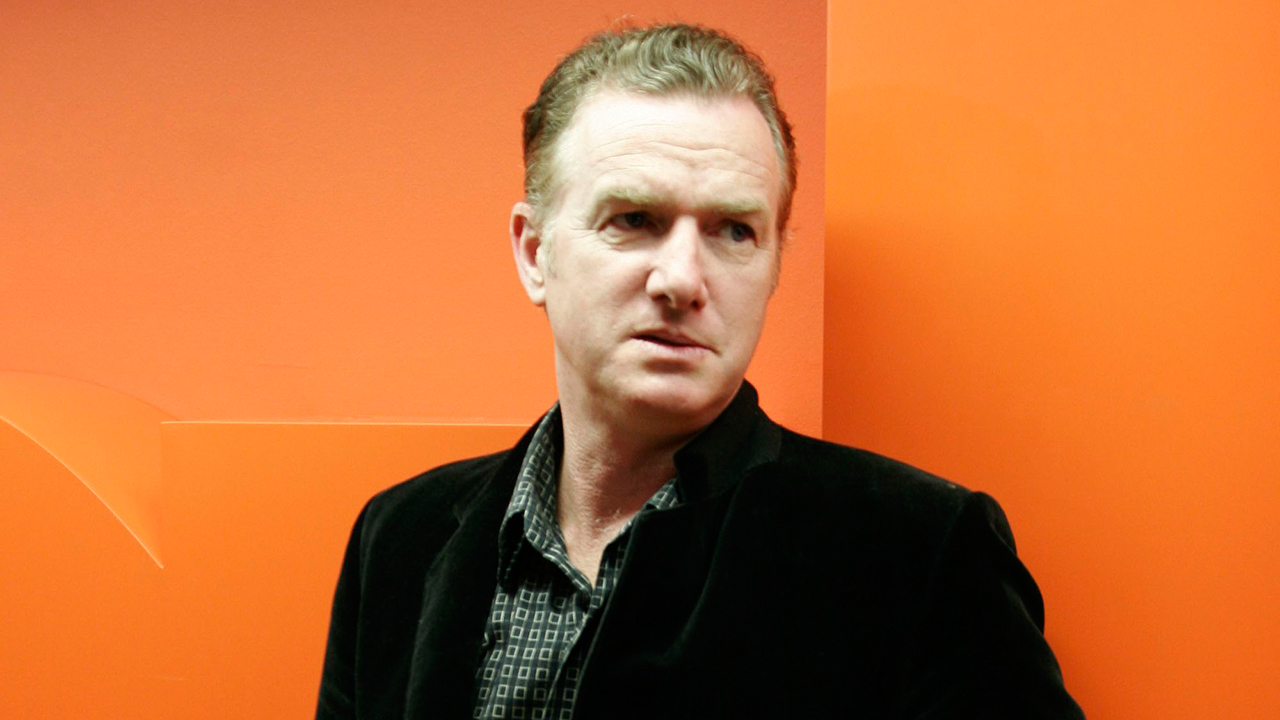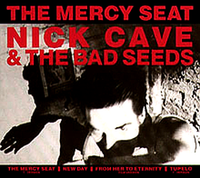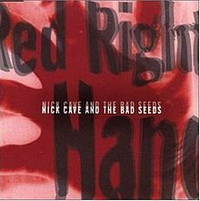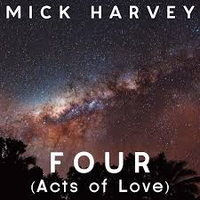Mick Harvey has been making records for more than four decades. Some of them have been the most mightily fierce, fucked up rock‘n’roll in history.
As a solo artist, he's written soundtracks for television and film, and made a series of albums dominated by a wonderful array of cover versions – most significantly of songs by Serge Gainsbourg.
His earliest bands were with Nick Cave: The Boys Next Door, The Birthday Party and The Bad Seeds, the latter partnership ultimately extending for 25 years, until 2009. Other than Cave, his best known work has been with PJ Harvey. Those projects have spanned nearly 20 years.
Not all of his relationships have been frictionless, but Harvey’s career has been marked by the longevity of his creative partnerships.
“Maybe I’m just a complete bastard,” he observes. “But most people don’t think that. I kind of trust most people.”
Indeed, the day after talking Louder through his list of songs, Harvey was planning to pay a visit to two elderly ladies he’s known most of his life.
“I’m going over to pick up Nancy Pew (mother of The Birthday Party’s Tracy Pew) and take her over to see Dawn Cave (mother of Nick). They haven’t seen each other for a few years. Nancy hasn’t been well enough to travel across town by herself.”
Get the Louder Newsletter
The latest news, features and interviews direct to your inbox, from the global home of alternative music.
Mick Harvey might well be a bit of a sweetheart, but his songs – from the hardest edged to the most beautiful – share a rigour and discipline that have served them well.
Here, from the hundreds he had to choose from, are Mick Harvey’s, 12 most vital songs.

Big-Jesus-Trash-Can (The Birthday Party - Junkyard, 1982)
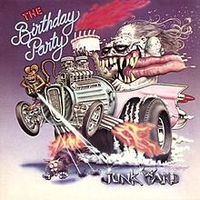
Big-Jesus-Trash-Can is a bit of a touchstone for me. It epitomises other stuff where I was writing that kind of music, like Release The Bats and Six Inch Gold Blade. I had found a path, a creative outlet for some ideas that were exciting for me. I was punk-jazz inspired in some kind of weird way.
It wasn’t highbrow jazz, more like sleazy jazz, the kind of jazz they were using in noir movies. That’s the kind of thing I was referencing, that really earthy, gritty jazz, which related to what we were doing in the band. I’m not much of a jazz fan. I like minimal jazz: all those albums that everybody likes when Miles Davis doesn’t blow too much; filmic jazz that’s very atmospheric. That’s what I went for. That’s what Big-Jesus-Trash-Can is compositionally.
I was always more engaged with the whole thing than wanting to be a songwriter. But looking back now, I can see that it was very fulfilling to have that confirmation of writing, along with production and playing guitar.
I began very much just playing guitar in a band, which was something I enjoyed and I think is a creative thing to do but that has its limitations ultimately. Somehow around 1981/82, we found a particular trajectory with The Birthday Party where I was composing quite a bit of music. I think Prayers On Fire had one co-write on a piece of music I submitted, Junkyard had three and by the time of The Bad Seed EP, I was basically co-writing all the music. So, I went through a bit of a patch there, where I really found something.
Although being in The Birthday Party was chaotic, Big-Jesus-Trash-Can wasn’t a struggle at all. The music was flowing fast and free at the time, at least from where I was sitting, and from what Nick was doing. It was all going very well. However, if you’ve got two or three people who were quite chaotic and the other two or three people are trying to keep it together, you’ve got a band that is at odds with each other.
Everyone had a different style of how they were conducting themselves and how they were communicating. Phill Calvert was pretty together. Tracy was quite a heavy drinker, which could be alright. Or not. But then it was the same with the other drugs too. Sometimes it was alright, and sometimes it wasn’t. It just depended on how bad – or how good – their timing was. That was part of what we were doing. If we had all been sober like me, it wouldn’t have been happening like it was.
When it was the right timing and the right chemistry – the outer chemistry, not just the internal band chemistry – it was really adding something exciting and unpredictable to what was happening. There was an element of that which was going into the band. I had to live and work with it because I understood it was part of what was exciting about what we were doing.
Deep In The Woods (The Birthday Party - The Bad Seed EP, 1983)
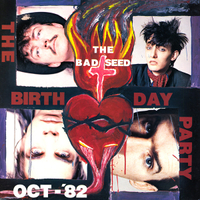
This is the only song that I ever wrote with Nick where we sat together and wrote it in the same place. I hate writing face-to-face with people. Not interested. Don’t like it that you are having creative ideas and somebody else is there watching you. And I’m not the only one who feels like that, I can assure you.
Nick collared me in the van on tour, probably in Germany, and said: “Would you write this song with me?” He had the lyrics. I said: “Why don’t you write it with Rowland?” He said: “I don’t want to write with Rowland any more.” Rowland was there in the van. So this was a significant historical turning point. I thought: “Well, now we’re fucked, aren’t we?” When the two main songwriters aren’t talking to each other much, it was all kind of inevitable.
I sat there with the guitar and wrote the guitar line to Deep In The Woods while Nick sang the words, with the engine noise going. It took 10 minutes or something: three verses and then the end section where it goes all free form, that came later.
Even though it seems like a signature Rowland S Howard guitar line, he actually played exactly what I wrote.
Deep In The Woods took us into that phase of the band where I was co-writing all the songs. Nick would write some music at the time, but he didn’t write a lot, so he usually came to someone to get more musical material for the amount of words he had.
Also around this time, we made some weird decision that albums were too difficult for us because we were a too intense a burst of energy, so it was better if we went in and recorded three or four songs and got them down really quickly. We did (The Bad Seed and Mutinty) as two EPs but really they are one good album.
Deep In The Woods was the beginning of the downward spiral.
Initially, we got a good result out of the energy we had by moving to Berlin and the new things we were experiencing there, but then we couldn’t really spin that out much further. The writing was on the wall. For the Mutiny EP, it was pretty hard squeezing those songs out and figuring out where we wanted to take it. It had lost its immediacy and energy. The obvious direction we’d always had to go in, that was gone too.
Our mission in The Birthday Party was to destroy rock’n’roll from within. We knew we wouldn’t, but it was worth trying: by using its own history as ammunition against it, killing it with its own germs. And having fun trying to do it. Unfortunately, we failed.
Tupelo (Nick Cave And The Bad Seeds - The Firstborn Is Dead, 1985)
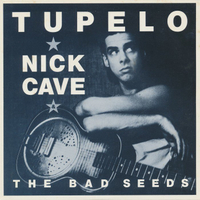
I saw Barry Adamson talking about this recording on the documentary Hansa Studios: By The Wall 1976-90, which was interesting because he took the view that I had stolen his idea for the bass line, when actually we had discussed it very openly before we went out into the room to record.
Nick was doing one of his normal plodder songs: dong, dong, dong, dong. 'Looka yonder!' Der-der-der-der; all on one chord. Clearly this wasn’t very exciting, although there was something in there: there was a rhythm in the way he was singing and the lyrics were really interesting.
I suggested: “Why not try to make a cyclic bass-line that had a bit of a feel, a bit of a groove in it, a bit like what Barry had played on St Huck on the previous album (From Her To Eternity)?”
Barry went to the drums and I went to the bass. He was very suspicious of this. I actually started by trying to play St Huck backwards, but that wasn’t quite right, so I changed it and found the bass-line for Tupleo.
When Nick sang the chorus, I added in a chord change. The basic track was me playing bass, Barry playing a tom-tom and Nick singing. Live. For seven minutes. Without a click. We got a feel for the riff and the changes and played it. It was no longer being jammed.
In the end Barry is co-credited with the music because it was based on his idea of a bass-line, but he didn’t actually write it. He got a co-credit on the music, so I don’t know why he carries on like I’ve stolen his idea. That’s ridiculous. I don’t know what he’s complaining about. He could just as easily have not been credited at all.
In that line-up of The Bad Seeds, Nick was on the piano occasionally but couldn’t concentrate long enough to do a take of anything and Blixa didn’t really play guitar; he sort of made noises. The other two were me and Barry, so we had to be pretty versatile.
I loved playing with Barry. He’s a brilliant musician and our voices blend really beautifully together too. It was a great shame for me, incredibly disappointing when he left the band. He’s behaved weirdly and said rude things about me for a few decades, but I loved working with Barry. It’s inexplicable, one of those weird personal things.
The Bad Seeds still play Tupelo sometimes. I don’t know why. You could just as easily ask why they still play Jack The Ripper. You could especially ask that because it’s a pretty poor song. At least Tupelo is a pretty good song.
Nick has some idea about the purpose some of the songs have, the function that they have in a live setting and he adheres pretty strongly to those. I think sometimes he hasn’t got it right about how they are functioning. It’s how they function for him. He feels empowered to deliver something but I don’t know if the audience is necessarily feeling that about the song; maybe about his performance, but not hearing the song. ‘Tupelo’ is maybe one he feels like he can pull out from the early years and still relate to on some level.
The British press didn’t have a lot of positive things to say about The Firstborn Is Dead but I think the album is really good. It’s a very atmospheric record. It’s always talked about as ‘the Blues album’ but it’s a Blues album made by people who can’t play the Blues. So it’s something else. It’s a little bit like when I attempted to make a disco-soul album with Anita Lane, it was inevitably not going to sound like disco or soul, because I can’t really play that music properly. And that’s the point on some level. I don’t think anyone in the band – Nick, Blixa, myself or Barry - wanted to make a proper Blues album. In fact, far from it. We knew it would come out like some weird deformed baby. That’s what we were hoping for and that’s what we got.
The Mercy Seat (Nick Cave And The Bad Seeds - Tender Prey, 1988)
If you want background to the song and how it was written, you’d be well served to read the essay that’s in the recent box-set Lovely Creatures: The Best of Nick Cave and The Bad Seeds. It’s a complex thing, I think Nick was quite curious and couldn’t remember why I had a co-write credit because he was in whatever condition he was in by the time all that was happening. So he was interested to hear what I had to say (in Mark Mordue’s essay Wood And Wire: Who Wrote The Mercy Seat?) as to why I had a co-write on that song.
(Harvey hit bass guitar strings with a drumstick constructing chordal changes over a fast drum machine beat. He also repurposed some of the chords he had written for Sugar In A Hurricane for Anita Lane.)
I don’t really want to go into that, but suffice to say The Mercy Seat is the centrepiece, the peak of that first, early Bad Seeds period. It became a kind of focal point. That’s still in the set too because it’s such a strong song. So I’m quite proud to have credit on that. I did do some things in the construction of the song, but Nick wrote the song.
In his writing, Nick got to the point of this major piece, a fulcrum of a lot of things that happened before and after. It sits there as being a major moment. I think we knew it was a major piece at the time, but you just keep working, not knowing what the next great thing will be.
I can also tell people Johnny Cash recorded a song I co-wrote: that’s pretty cool. I was already very interested in the 'American' series he was doing with Rick Rubin. I had to send them the chords because nobody else knew them at the time, so I guess I must have written something.
Red Right Hand (Nick Cave And The Bad Seeds - Let Love In, 1994)
Red Right Hand came originally from a jam in Melbourne when we were demoing stuff. Most musicians, most composers have a thing where they go to the same kinds of patterns. Nick would go to similar chords on the piano in this key or that key. He just got frustrated and went: “Play me something in a key I don’t know.” I was sitting on the bass, Thomas Wydler was on the drums and Nick was sitting at an organ. That was the only people there.
I just thought: “B Minor” and just start playing the bass-line. It just came out. Tommy started playing the drums and we recorded a song which Nick improvised 100% called Where The Action Is.
When we came to do Let Love In, both myself Thomas and Blixa all put our two bob’s worth in to say we should do something with this piece of music. Nick was a bit shocked about this and not particularly interested, but we persuaded him to have a go recording that piece of music for the album. He had different versions of lyrics for something called Red Right Hand and he started applying some of the words he had to us recording this music.
Apparently, I’m credited with playing the bell. There are so many other versions with other people playing bells, I’d forgotten it was me. It was a tubular bell, a B. We were in Townhouse 3, one of The Who’s studios, and there were a lot of orchestral instruments in there: timpani and tubular bells, a marimba and a gigantic vibraphone; not that common for rock‘n’roll. It was really made for us. We loved having that stuff around.
Red Right Hand wasn’t the standout track at the time, although, it was one of my favourite tracks. It was a very odd song, a weird atmospheric piece, not particularly commercially viable, an interesting album track. Yet, if things keep being exposed enough, people come around.
Had we known it was going to be in [Hollywood movie] Dumb And Dumber (when Jim Carrey in a giant foam cowboy hat buys a copy of the Rhode Island Slut newspaper), we would have said no. They got permission from our publisher but it was so last minute that our publisher failed to consult us.
Red Right Hand is in Peaky Blinders all the time. Annoyingly so. It’s a bit hard for me to watch it. I watched the first season but with that and other Bad Seeds instrumental bits and PJ Harvey singing, it was all very distracting for me.
Yesterday, my wife just showed me Snoop Dogg doing Red Right Hand on her phone. That’s very bizarre.
Bonnie & Clyde (Mick Harvey - Intoxicated Man, 1995)
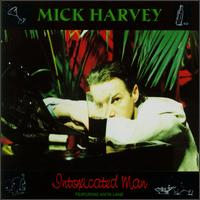
Outside of Je T’aime, Lemon Incest – which I’d seen the video for on Saturday morning TV in Melbourne; it was quite an eyebrow raiser – and The Life And Death Of Felix The Cat, the four polaroid series which Gainsbourg did, Bonnie & Clyde was the first song of his that I heard. It was played to me by a friend. We were on tour in France, playing in Nancy and we went to a bar and he put it on the jukebox. I thought: “Wow, there’s a bit more to this guy than just his notoriety, Harley Davidson by Brigitte Bardot and a dodgy disco version of Chopin with him singing with his daughter on the beach.” From that point on, I was very interested to investigate further. It’s still a really powerful song: interesting musically, great atmosphere.
The lyrics are more curious than most of the others in my Gainsbourg project. It has an unusual backstory: Gainsbourg’s lyrics are based on Bonnie Parker’s letter. There’s a recording of him trying to read the letter in English over the music, which is pretty strange. It includes the line: 'If you can’t finned, the fined'. He was trying to say, 'If you can’t find the fiend.' I was able to go back and incorporate the original letter – when it was helpful – into verses, which are sung. So my version becomes a pastiche of all those possibilities. There are so many ways you can take translation.
Bonnie & Clyde is from that period when Gainsbourg was very inspired. Finally, he found himself in a phase where he wasn’t just trying to copy the popular production style of the time or trying to get young girls to have Eurovision hits. In this period, the whole impetus was to do your own things and his music became really interesting, from ‘68 through to …Melody Nelson and L'Homme à tête de chou, he came unshackled from trying to get success. It was a good period for him, trying to be original and really coming up with the goods.
Out Of Time Man (Mick Harvey - Two Of Diamonds, 2007)
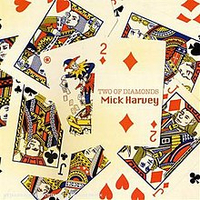
I started making solo albums some time around 2005. I made a couple of albums One Man’s Treasure and Two Of Diamonds based on lists of favourite songs that had a level of obscurity. They were songs I felt were, in a broad sense, unknown, but I held to be classic pieces of song writing.
Roland Wolf, who was the piano player in the Bad Seeds for one album, had put the original of this song on in one of the famous Berlin bars, the Ex’n’Pop. He was waxing lyrical about how great he thought this song by Mano Negra was. It’s a very charming song, very catchy, very cute, like a lightweight version of The Passenger.
I kind of recorded it in memory of Roland. He died in 1995 when The Bad Seeds were recording Murder Ballads. He died young, in his 30s. I had this strong memory of him playing it to me in the bar. It has stayed with me.
I recorded some of the songs on Two Of Diamonds in memory of other people. A lot of the songs were written by friends, who are more obscure artists, but who I think are great songwriters. Many of them have passed away. That was part of the source of my motivation, part of the selection process.
Another reason I chose that song for this list is because it’s one people do know because of Breaking Bad. I got a request through from the production company asking to use that song in the pilot. I went: “Sure.” You never know. Pilots don’t always get made into series or you get requests through and they don’t use it in the film. But they did use it and Breaking Bad became one of the biggest shows ever. That song has given life to the rest of the album.
They didn’t tell me how they would use it. (It plays over the end scene in the pilot in which Walter White is sexually re-energised with his wife). When I did finally see it, it was a bit a creepy but strong and memorable. The lyrics are very appropriate for the entire series that comes after.
Like Red Right Hand, Out Of Time Man was a song that I never would have expected people to pick up on. It’s down the end of the album, an odd one I threw in there. It’s amazing how these things stick: someone discovers them and they find an outlet and become exposed. I wonder how many more of the songs would get that attention, if they got that kind of exposure. It is really remarkable how that happens. It shows to me that what I’m doing isn’t that weird.
The Colour Of The Earth (PJ Harvey - Let England Shake, 2011)
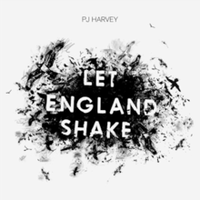
Having done a lot of work with PJ Harvey, I thought it was appropriate to include one of her songs. I’ve worked on several of her albums and have co-produced two of them. The first thing we did together was when I came in and played bass on about four tracks on To Bring You My Love.
For Let England Shake there were about four or five songs where she was unhappy with the basic direction of her demo and she said: “Oh, let’s start from scratch and do it a different way” and the band worked it out. The rest we followed the basic idea and feel of her demo closely, but we were given the space to add our own ideas, which isn’t always the case with Polly. There was a really good working environment on that album.
The Colour Of The Earth was one that followed the demo pretty closely. She said to me: “You should sing the opening verse because it has to be a male voice.” I said: “OK, I’ll give it a shot.” ‘The Colour Of The Earth’ is a folk song, a traditionally constructed little ballad. That was very deliberate. The way the music was written to go with that was very deliberate too: very simple chord shifts.
A few of the songs on that project – including this one – were based on stories about the ANZACs in Gallipoli. Oddly, she had an Australian in the band but it didn’t occur to me at the time. I was very familiar with the song by then and I wasn’t thinking about that specifically, but it was all very fitting.
There was also a common interest we had. We read quite a few things about World War One in preparing and that’s something I’ve been interested in for quite a while. Even when I was in my early 20s, I read books about it. It must be something about the combination of the humanity and the machinery being so out of balance. There’s something on a human scale in World War I that’s deep and tragic. Something I’ve found interesting is trying to understand what that experience was for those soldiers.
Both my grandfathers were in World War One. That gives it a bit of extra seasoning. One of my grandfathers landed on the Gallipoli Peninsula on ANZAC day. My great-uncle was killed at Passchendaele.
That gives it an extra connection but when you sing words, there’s a level of disengagement from the real meaning. That may sound odd. You have a connection with the feel, but if you engage too much with the specifics of the words, you can get yourself into trouble. I don’t think you delve too far into your own emotions. You have to listen to how you are delivering the words and see if that feels right, almost as an actor might.
The Ballad Of Jay Givens/October Boy (Mick Harvey - Sketches From The Book Of The Dead, 2011)
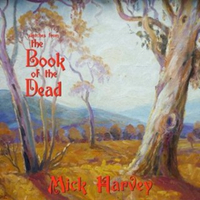
The next project I did was Sketches From The Book Of The Dead. Throughout the first two solo albums, I kept touching on people I had connections with, who weren’t there anymore. This seemed to be a common theme. Then, somehow I wrote a couple of songs quite quickly one month. I don’t write that many, they don’t just come out. It’s still not something I do much.
The abiding theme of these two songs was people that had passed away. I realised that maybe it was something I had an interest in and maybe should pursue, so I made a big list of people. The pre-existing songs weren’t there, so I realised I would have to write all the songs myself. Writing a whole batch of songs was something I’d never done before. One of those first two songs was The Ballad Of Jay Givens. That was a traditional style ballad, telling the story from beginning to end.
Literally the whole story is in the song – or what I understood of the story. It’s the story of my dad’s best friend (an Anglican minister who died by suicide). The name has been changed but it’s the story, as I was told it. I’ve subsequently found out that some of the details are wrong but that’s the point about stories. The story becomes how you remember it and how you re-relate it. They are formed out of misinformation and partial information. They are not always 100% accurate. So I just went with that: all the songs I wrote were based on my understanding. The rest of them followed quite easily.
October Boy was one of the last songs I wrote. I wrote it for Rowland S Howard, The Birthday Party’s guitar player.
I really didn’t want to write songs about people who were recently departed; I thought it might be a bit too raw and I might not have enough distance from the subject matter. The lyrics wonder whether the song will be carefree or sad because I didn’t have that distance.
The song is also a study of that problem. The first verses are quite funny, deliberately lightweight, not really describing him at all, just making funny allusions to describing him. The third and fourth verses are quite heavy. The lyric 'a single rose upon the side … Like the guitar he wrenched and tortured' is because his coffin had a rose on the side and his guitar had a rose on it too.
It’s quite a pivotal song. A friend of mine in Melbourne wrote an article about that song and I realised after reading it that it’s actually quite a complex lyrical idea. It’s a simple idea on one level, but on another it’s a song about writing a song, a sort of study of how you write a song. It turns around on itself in that way. I didn’t realise I’d done something so theoretical.
Summertime In New York (Mick Harvey - Four (Acts Of Love), 2013)
The original artist is Exuma. He had a major record deal in the early ‘70s. He pretended he was a Voodoo guy, but I think actually he was just a Bahamian who was living in New York and LA and working as a recording artist. I might be wrong about that; maybe he was a genuine Voodoo guy. The first two Exuma albums are absolutely amazing. They were quite a big thing in Berlin in the early ‘80s, on cassettes.
I also played them to Polly and she loves them. Same as a guy I work with called JP Shilo. For some reason, I just put Exuma on and he just turned and said, “What is this?” It’s like the missing link between everything that people don’t know about: between Dr John and Captain Beefheart through to The Cramps.
It’s that kind of obscure music that musicians are sourcing and sharing around in ‘the inner circle.’ It isn’t sellable or marketable and is lost in time, but the people who are really into music and making music, when they hear it, they get it and it opens up possibilities. On this list, Exuma represents all the things, which are like that.
The original is just brilliant, so funny. It is basically just him on guitar and is such a raggedy-arsed recording.
When I came to the end of the One Man’s Treasure/Two Of Diamonds project, I realised I had about five or six songs left and they were all love songs. What that said to me was that I had been avoiding love songs. That gave me an idea: “OK, we’ll be bold, let’s address this.”
I decided to write an album like a song cycle, going through the process of falling in love and using the songs to describe that. Summertime In New York is just placed where it could be the point at which some relationship is developed. I used the songs as the core and then wrote other songs to make a timeline.
Four (Acts Of Love) is a faux-story timeline of events, trying to study aspects of love and the love song and the meaning of the universe. It was a pretty large and crazy idea to do that. So it was a weird concept album, which I didn’t expect anyone to particularly understand.
Further Down The Line (Mick Harvey And Christopher Richard Barker - The Fall And Rise Of Edgar Bourchier And The Horrors Of War, 2018)
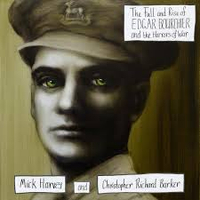
Christopher Richard Barker got in contact with me and sent me a whole lot of material. He said: “I have all these lyrics based on this crazy character, a World War One poet, from this book I’ve written. Would you like to have a look at these and be interested in doing some music?” I thought: “God, this sounds like a bridge too far.”
But then I thought: “If I’ve got a bit of time in the next month, I’ll take a look and send him something saying: ‘This is the kind of thing you could do with them’” with no real intention of taking it beyond that.
There were a lot of poems that could be used as lyrics, so I found I could be selective and pick ones I felt some connection with. So I did a couple and I found I really enjoyed the process of putting lyrics to music, which is not something I do that much. I’d done it with my own lyrics for …Book Of The Dead but hardly ever with other people. It doesn’t usually start with the lyrics, other than perhaps a couple of times with Anita Lane.
So I did another couple of Christopher’s poems and found I was still enjoying it and before I knew it, I had taken the decision: “Let’s do this thing.” I’m probably still regretting it (laughs).
Eventually, I came over to the UK because Christopher, perhaps inadvisedly, had decided he wanted to sing some of the songs. He’s not really a singer, although he’d love to be. So unfortunately he put me in a compromised position where I had to help him, whereas I would have much rather found people with a bit of experience, or who were natural singers and got them to do it. But that’s part of it when you collaborate. A couple of the songs he sang on, he did a really good job ultimately, but it was a lot of work to get those performances out of him.
The whole album itself is World War One material with a whole fictionalised backstory to it. Hopefully, Christopher will get his mammoth novel out eventually – the poet is one of the characters. Perhaps the album will make even more sense then, but it does stand on its own.
I think there are some amazing songs on there, including quite unusual atmospheric ones. I chose Further Down The Line because I didn’t want to scare anyone with one of weirder, freakier, scarier songs. It’s a beautiful song. Again it’s a kind of ballad. That is a recurring aspect of stuff that I do, for better of worse. I’m not sure why that happens. It’s not necessarily what I’m interested to listen to all the time, but there seems to be something that is a reoccurring theme in my career. Hopefully it’s not corny, or drenched in genre; generally, I like things to be a bit more imaginative and challenging than that in the music I make.
Mick Harvey heads out on tour in Europe in October and November. You can find the full dates on his official site.
